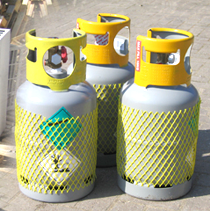What is the R22 Phase Out / Replacement?
Within any air conditioning system, there is a quantity of refrigerant running through the pipe work in order to cool the air. R22 refrigerant has been used by the industry for many years but it has been proven to contribute to the depletion of the ozone and therefore, the Government had begun restricting the use of R22 together with a phase out programme which will saw the complete ban of R22 use in 2014.
In the UK, buildings and facilities account for approximately 49% of our total energy consumption. In a typical office building, 55% of the energy used is through the building services; heating, cooling, ventilation and hot water.
What does it mean for you?
Whilst replacing existing R22 systems can be daunting for any business, it may be more simple than you anticipate with many systems benefiting from the new ‘replacement technology’ . This involves only the internal fan coil and external condensing unit being replaced rather than replacing the entire systems including pipe work and electrics which could involve building work.
If your air conditioning system is over seven years old now is the time to check out this legislation.
From 1 Jan 2010 it became illegal to use virgin hydrochlorofluorocarbons (HCFCs) such as R-22 (which has been the most commonly used refrigerant) when servicing and maintaining air conditioning equipment.Until the 31 December 2014 temporary use of recycled/recovered R-22 was possible but availability was limited and costs were high. From 1 January 2015 sales or use of recycled/recovered R-22 were prohibited.
The regulation also calls for all operators of HCFC refrigeration systems to take “all precautionary measures practicable” to prevent and minimise leakage.It states that all fixed equipment systems with a refrigerant charge greater than 3kg will require an annual check for leakage. This must be undertaken by qualified personnel and they will be required to properly recover any HCFC refrigerant removed from a system. PPS engineers are fully qualified to undertake this work.
How do you Comply?
If you own refrigeration or air conditioning equipment operating on R22 Refrigerant, we would strongly advise that you consider reviewing your options in order to minimise the impact on your organisation, both operationally and financially.
PPS has extensive experience in assisting clients plan for the R22 phase out. We can provide an audit of your air conditioning and refrigeration systems which will enable us to determine the most suitable action to ensure that not only will your company comply with the legislation but also facilitate you in saving money through significantly reduced energy costs.
What are the options?
Replace plant
Many R-22 units are now reasonably old and replacement through phase out is often the best way forward. The good news is that new systems using the latest inverter technologies are likely to have a significantly greater cooling capability (up to 15%) and to use far less electricity (on average approx. 50%). The payback period and the opportunity to make significant CO2 reductions can add up to a big incentive to invest.
An added incentive may be the Government’s Enhanced Capital Allowance Scheme which could allow accelerated tax relief on certain new equipment.
Refit or retrofit plant to use alternative refrigerant
Depending on the type, age and condition of equipment in some situations ‘replacement technology’ means it is possible to adapt systems to use legally permitted HFC’s or an HFC blend (drop in replacements). System efficiency and reliability needs to be considered and only qualified engineers can undertake this work.
PPS can help you with the forward planning and installation of R22 refrigerant plant replacement and advise you on the best approach to achieving your required capacity and improving energy efficiencies with R22 Phase Out.

